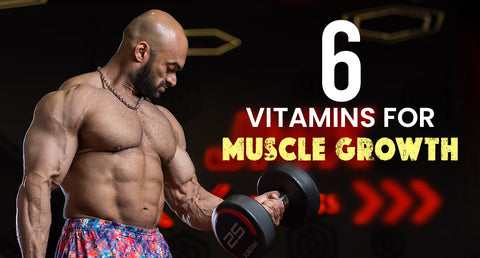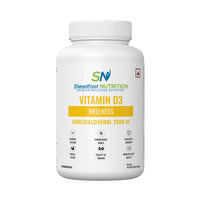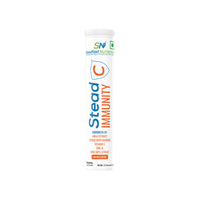How our bodies function is a real work of art. It’s intriguing how a number of functionalities put together help make a healthy ecosystem for a healthy body.
People usually consider macronutrients to be more important and make it a point to have enough in their daily diet, but this should never be at the cost of neglecting micronutrients- vitamins and minerals. Micronutrients, including vitamins and minerals, are essential for the proper functioning of the human body. While they are required in smaller quantities compared to macronutrients (carbohydrates, proteins, and fats), they play critical roles in maintaining overall health and well-being.
Taking adequate vitamins is crucial for overall health- these micronutrients play an important role in various physiological processes, including muscle recovery and growth. While vitamins alone cannot build muscles, they are essential for maintaining good health and can support the recovery and growth process.
What are Vitamins?
Vitamins are organic compounds essential for normal bodily functions and overall health. They are required in small amounts and cannot be synthesised by the body in sufficient quantities, so one needs to take them through the diet or supplements. Vitamins perform several necessary functions, including:\
1. Nutrient Metabolism:
Vitamins play a crucial role in the metabolism of macronutrients (carbohydrates, proteins, and fats) into energy. They act as coenzymes, which means they assist enzymes in various metabolic reactions that convert food into usable energy for the body.
2. Antioxidant Defence:
Intense exercise can lead to the production of free radicals- reactive molecules that can cause oxidative stress and damage cells. Vitamins C and E are antioxidants that help neutralise these free radicals, reducing muscle damage and promoting recovery.
3. Immune Function:
Intense exercise can temporarily suppress the immune system, making you more susceptible to illness and infection. Several vitamins, including vitamins A, C, and D, are known to support immune function. By maintaining a healthy immune system, your body can recover more efficiently from exercise-induced muscle damage.
4. Enzyme Function:
Enzymes are proteins that facilitate biochemical reactions in the body. Many vitamins are essential for the proper working of enzymes, enabling them to carry out specific reactions necessary for various physiological processes. Without adequate vitamin levels, enzyme activity may be compromised.
5. Cellular Function:
Vitamins are involved in maintaining the normal functioning of cells- if vitamin quantities are apt at the cellular level, it leads to optimum muscle functioning. Vitamins support cellular processes such as DNA synthesis, cell growth, and cell signalling and also contribute to the production of neurotransmitters, hormones, and other important molecules involved in cell communication.
Here are six vitamins needed for muscle growth
1. Vitamin D:
Vitamin D, also known as the "sunshine vitamin," is a fat-soluble vitamin that plays a crucial role in various functions throughout the body. This vitamin is crucial for bone health and muscle fitness. It helps your body absorb calcium, which is essential for muscle contraction. Vitamin D deficiency has been linked to muscle weakness and impaired recovery. Sources include sunlight exposure, fatty fish (such as salmon and mackerel), fortified dairy products, and egg yolks.
However, it can be challenging to meet the body's vitamin D needs through diet alone. In cases where vitamin D deficiency or insufficiency is diagnosed, supplementation with vitamin D capsules may be recommended by a healthcare professional. Steadfast Nutrition has the best vitamin D supplement. You can buy it from Steadfast Nutrition’s official website or a leading e-commerce platform like amazon.
2. Vitamin C:
Vitamin C or ascorbic acid is a water-soluble vitamin that plays a crucial role in maintaining the proper functioning of the body. This vitamin is an antioxidant that helps protect cells from damage caused by intense exercise. Vitamin C is good for the skin as it plays a role in collagen synthesis, which is important for the health of tendons and ligaments. Foods high in vitamin C include citrus fruits, berries, kiwi, bell peppers, and leafy greens. Check best vitamin c tablet price.
Vitamin C plays a vital role in enhancing the function of various immune cells, such as white blood cells, and promotes the production of antibodies, essential for fighting off infections. Vitamin C tablets can be included in the diet to fulfil the daily intake with the guidance of professionals.
3. B Vitamins:
B vitamins are a group of water-soluble vitamins that play essential roles in various bodily functions. There are several B vitamins, each with its unique function and derived from a different source. B vitamins are involved in energy production and can support muscle recovery. Vitamin B6, in particular, is important for protein metabolism, which is crucial for muscle growth. Good sources of B vitamins include whole grains, meat, fish, eggs, dairy products, leafy greens and fortified foods.
The main B vitamins are Thiamin (B1), Riboflavin (B2), Niacin (B3), Pantothenic Acid (B5), Pyridoxine (B6), Biotin (B7), Folic Acid (B9) and Cobalamin (B12).
4. Vitamin E:
Vitamin E is a fat-soluble vitamin and antioxidant that plays a crucial role in maintaining the health of cells and tissues in the body. This vitamin is an antioxidant that helps reduce oxidative stress in the body, which can occur during intense exercise. It may aid in muscle recovery by reducing inflammation. Nuts and seeds (such as almonds and sunflower seeds), spinach, and avocado are good sources of vitamin E.
Vitamin E is often used in skincare products due to its antioxidant properties. It helps protect the skin from oxidative damage caused by environmental factors, such as UV radiation and pollution. Vitamin E may also help moisturise the skin and promote its overall health and appearance.\
5. Vitamin A:
Vitamin A is a fat-soluble vitamin that plays a critical role in various physiological functions in the body. Vitamin A plays a role in protein synthesis and promotes the growth and repair of tissues, including muscles. Good sources of vitamin A include liver, sweet potatoes, carrots, spinach, and other leafy greens.
Vitamin A is involved in cell growth, development, and differentiation. It plays a role in the growth and maintenance of various tissues in the body, including epithelial cells, which line the surfaces of organs and body cavities.
6. Vitamin K2:
This vitamin is known as menaquinone, is a lesser-known form of vitamin K. It belongs to the family of fat-soluble vitamins and plays an important role in various physiological processes. The primary function of vitamin K2 is to activate proteins that are involved in blood clotting and bone metabolism. It is essential for the production of clotting factors that help in the coagulation of blood when injuries occur. Clinical trials in sarcopenia suggest vitamin K supplementation could improve muscle mass and function. Muscle cell studies suggest vitamin K2 encourages muscle cell proliferation, which helps build muscle. Observational trials suggest that high levels of vitamin K are associated with increased bone mineral density and reduced fracture risk.
Vitamins might not have been an area of concern for people involved in strength training, but they definitely have a connection with helping build stronger muscles and muscle recovery. Best vitamins for building muscle is important for healthy recovery and to lead a healthy life.
While it's important to obtain these vitamins through a balanced diet, some individuals may benefit from muscle building supplements. Remember that a well-rounded diet, adequate protein intake (Check best whey protein), and regular exercise are key components of muscle recovery and growth. Always go for best vitamins for working out to make the best out of your each session without feeling fatigued ensuring faster recovery.
You can trust the best multivitamin by Steadfast Nutrition for muscle growth- it has the composition for daily vitamin requirements bodybuilding as a sport needs.



